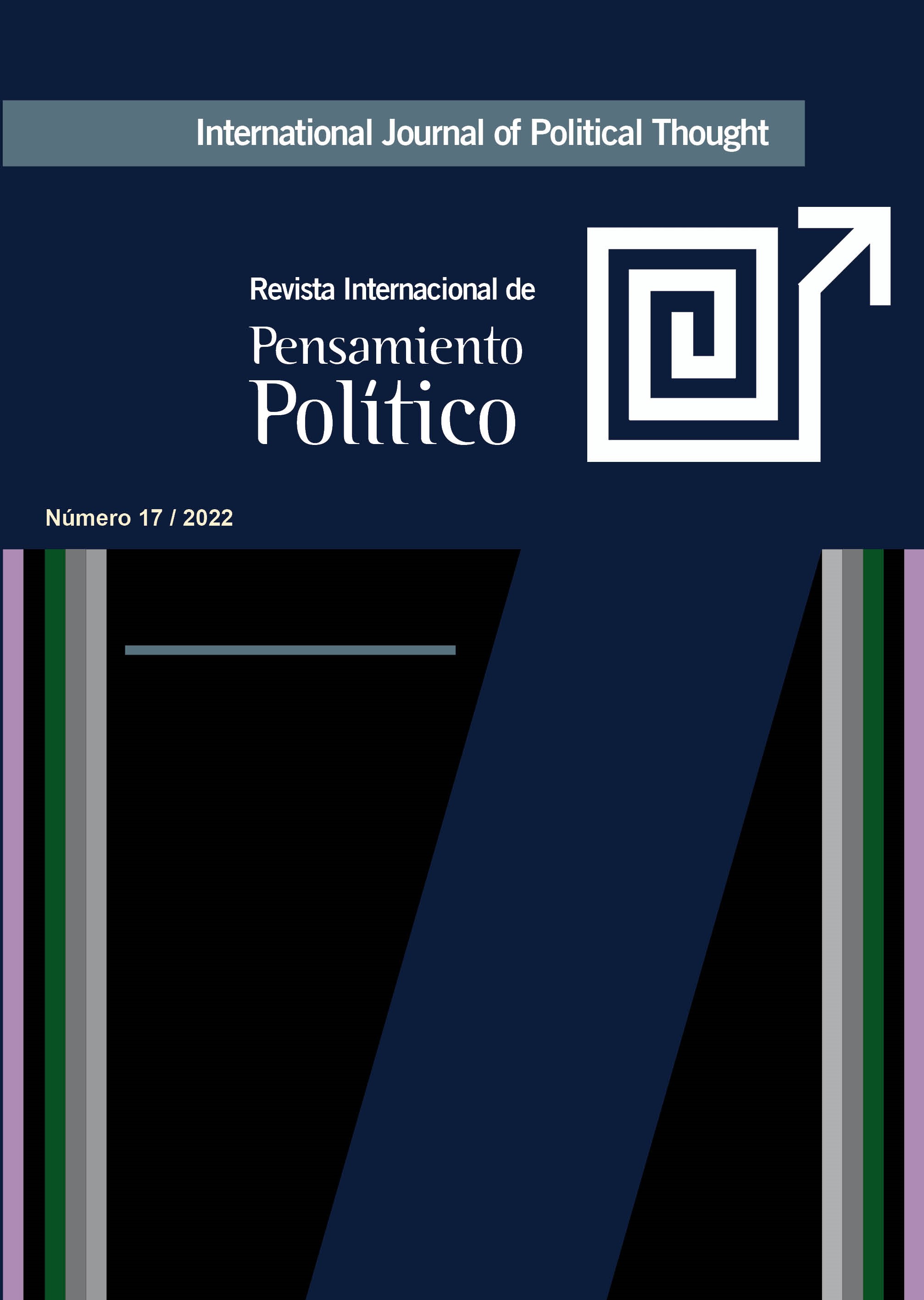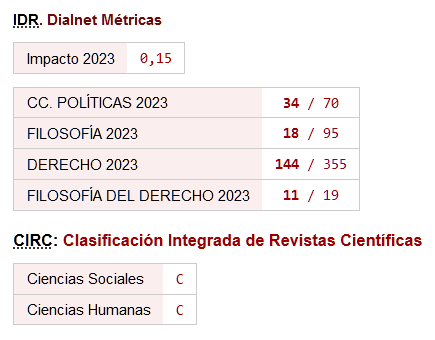Libertad de movimiento, exclusión de inmigrantes y derecho a viajar
DOI:
https://doi.org/10.46661/revintpensampolit.7542Palabras clave:
derecho a viajar, derecho de exclusión, migraciones, libertad de movimiento, fronteras abiertas, ética de las migracionesResumen
Los debates sobre movilidad humana se han centrado en las migraciones como asentamiento, pasando por alto los viajes y las estancias de corta duración. El objetivo de este artículo es doble. El primero tiene que ver con la necesidad de distinguir ambos fenómenos. Para ello se planteará la necesidad de concebir los viajes conceptual y normativamente separados de las migraciones. A partir de esta distinción, se procederá con el segundo objetivo, a saber, la defensa del derecho a viajar, fundamentado en el valor instrumental e intrínseco de la libertad de circulación. Solo si entendemos la movilidad como la norma podremos comenzar a establecer excepciones que delimiten su ejercicio. A continuación, se examinan los argumentos más habituales a favor de los controles migratorios, y se concluye que no son aplicables al caso de los viajes. El artículo responde también a dos objeciones adicionales: el de la prolongación no autorizada de la estancia como forma de migración encubierta y el de la arbitrariedad de la distinción entre los viajes de corto y largo plazo. Por último, se plantean algunas situaciones que podrían dar lugar a una restricción legítima del derecho a viajar.
Descargas
Citas
Bauböck, R. (2009). “Global Justice, Freedom of Movement and Democratic Citizenship”, European Journal of Sociology, vol. 50, 1-31. https://doi.org/10.1017/S000397560900040X
Blake, M. (2001). “Distributive justice, state coercion, and autonomy”, Philosophy & Public Affairs, vol. 30, n.º 3, 257-296. https://doi.org/10.1111/j.1088-4963.2001.00257.x
Blake, M. (2005). “Immigration”, en Frey, R. G. y Wellman C. H. (eds.), A companion to applied ethics, Malden, Blackwell Publishing Ltd, 224-237.
Blake, M. (2013). “Immigration, jurisdiction, and exclusion”, Philosophy & Public Affairs, vol. 41, n.º 2, 103–130. https://doi.org/10.1111/papa.12012
Blake, M. (2014). “The right to exclude”, Critical Review of International Social and Political Philosophy, vol. 17, n.º 5, 521-537. https://doi.org/10.1080/13698230.2014.919056
Carens, J. (2013). The ethics of immigration, Nueva York, Oxford University Press.
Cole, P. (2000). Philosophies of Exclusion: Liberal Political Theory and Immigration, Edimburgo, Edinburgh University Press.
Department of Homeland Security (2020). Fiscal year 2019 entry/exit overstay report. Recuperado el 20 de mayo de 2022 de: https://www.dhs.gov/sites/default/files/2021-12/CBP%20-%20FY%202020%20Entry%20Exit%20Overstay%20Report_0.pdf
Fine, S. (2010). “Freedom of Association Is Not the Answer”, Ethics, vol. 120, n.º 2, 338-356. https://doi.org/10.1086/649626
Fine, S. (2013). “The Ethics of Immigration: Self-Determination and the Right to Exclude”, Philosophy Compass, vol. 8, n.º 3, 254-268. https://doi.org/10.1111/phc3.12019
Hidalgo, J. (2019). Unjust Borders: Individuals and the Ethics of Immigration, Nueva York, Routledge.
Huemer, M. (2010). “Is there a right to immigrate?”, Social Theory and Practice, vol. 36, n.º 3, 429-461. https://doi.org/10.5840/soctheorpract201036323
Instituto Nacional de Estadística (2019). Cuenta Satélite del Turismo de España (CSTE). Revisión estadística 2019. Recuperado el 20 de mayo de 2022 de: https://www.ine.es/prensa/cst_2018.pdf
Kant, I. (1998). Sobre la paz perpetua, Madrid, Editorial Tecnos.
Kukathas, C. (2021). Immigration and Freedom, Princeton, Princeton University Press.
Lægaard, S. (2010). “What is the Right to Exclude Immigrants?”, Res Publica, vol. 16, n.º 3, 245-262. https://doi.org/10.1007/s11158-010-9122-2
Lenzen, M. et al. (2013). “The carbon footprint of global tourism”, Nature Climate Change, vol. 8, n.º 6, 522-528. https://doi.org/10.1038/s41558-018-0141-x
Loewe, D. (2020a). “Cuando la libertad importa: inmigrantes y movilidad libre”, Estudios Públicos, n.º 157, 7-46. https://doi.org/10.38178/cep.vi157.3
Loewe, D. (2020b). “Cuestionando la relación entre libertad de asociación y el derecho de excluir a los inmigrantes: tres argumentos en contra de la tesis de Ch. H. Wellman”, Bajo Palabra, n.º 23, 187-210. http://dx.doi.org/10.15366/bp.2020.23.007
Miller, D. (2016). Strangers in our midst. The political philosophy of immigration, Cambridge, Harvard University Press.
Nagel, T. (2005). “The Problem of Global Justice”, Philosophy & Public Affairs, vol. 33, n.º 2, 113-147. https://doi.org/10.1111/j.1088-4963.2005.00027.x
Nine, C. (2019). “Do territorial rights include the right to exclude?”, Politics, Philosophy & Economics, vol. 18, n.º 4, 307-322. https://doi.org/10.1177/1470594X18788345
Niño Arnaiz, B. (2021). “Mugak, harresiak eta giza mugikortasuna: marko teoriko-normatiboa”, Inguruak. Revista Vasca de Sociología y Ciencia Política, n.º 71, 50-72. http://dx.doi.org/10.18543/inguruak-71-2021-art04
Niño Arnaiz, B. (2022a). “Ética de las migraciones, fronteras y movilidad humana”, Oxímora. Revista Internacional de Ética y Política, n.º 21, 1-21. https://doi.org/10.1344/oxi.2022.i21.39374
Niño Arnaiz, B. (2022b). “Should we open borders? Yes, but not in the name of global justice”, Ethics & Global Politics, vol. 15, n.º 2, 55-68. https://doi.org/10.1080/16544951.2022.2081398
Oberman, K. (2016). “Immigration as a Human Right”, en Fine, S. & Ypi, L. (eds.), Migration in Political Theory. The ethics of movement and membership, Nueva York, Oxford University Press, 32-56.
Organización Internacional para las Migraciones (2020). Informe sobre las migraciones en el mundo en 2020. Recuperado el 20 de mayo de 2022 de: https://publications.iom.int/system/files/pdf/wmr_2020_ es.pdf
Organización Mundial del Turismo (s.f.). Glosario de términos de turismo. Recuperado el 20 de mayo de 2022 de: https://www.unwto.org/es/glosario-terminos-turisticos
Pevnick, R. (2011). Immigration and the Constraints of Justice: Between Open Borders and Absolut Sovereignty, Cambridge, Cambridge University Press.
Sager, A. (2016). “Methodological Nationalism, Migration and Political Theory”, Political Studies, vol. 64, n.º 1, 42-59. https://doi.org/10.1111/1467-9248.12167
Sager, A. (2018). Toward a Cosmopolitan Ethics of Mobility: The Migrant’s-Eye View of the World, Cham, Springer. https://doi.org/10.1007/978-3-319-65759-2
Sandelind, C. (2015). “Territorial rights and open borders”, Critical Review of International Social and Political Philosophy, vol. 18, n.º 5, 487-507. https://doi.org/10.1080/13698230.2013.864796
Sheller, M. (2018). Mobility justice: The politics of movement in the age of extremes, Londres, Verso.
Song, S. (2018). “Political Theories of Migration”, Annual Review of Political Science, vol. 21, 385-402. https://doi.org/10.1146/annurev-polisci-082317-093019
Song, S. (2019). Immigration and Democracy, Nueva York, Oxford University Press. https://doi.org/10.1093/oso/9780190909222.001.0001
Torpey, J. (2006). “Yendo y viniendo: la monopolización estatal de los legítimos ‘medios de movimiento’”, Zona abierta, n.º 116-117, 59-88.
Velasco, J. C. (2012). “Fronteras abiertas, derechos humanos y justicia global”, ARBOR. Ciencia, Pensamiento y Cultura, vol. 188, n.º 755, 457-473. https://doi.org/10.3989/arbor.2012.755n3001
Walzer, M. (1993). Las esferas de la justicia. Una defensa del pluralismo y la igualdad, Ciudad de México, Fondo de Cultura Económica.
Wellman, C. H. y Cole, P. (2011). Debating the ethics of immigration: Is there a right to exclude? Nueva York, Oxford University Press.
Descargas
Publicado
Cómo citar
Número
Sección
Licencia
Derechos de autor 2022 Borja Niño Arnaiz

Esta obra está bajo una licencia internacional Creative Commons Atribución-NoComercial-CompartirIgual 4.0.
Política de acceso abierto
Se permite el acceso libre y abierto de cualquier interesado a todos los contenidos de los números de la revista, sin costo alguno, pudiendo imprimir y trasladar todos los artículos, con la única condición de precisar la fuente y la autoría.
La revista: a) no cobra a las autorías costes por el procesamiento de los artículos ni por el envío de los mismos, b) mantiene el copyright para los autores sin restricciones, c) facilita a los autores conservar sus derechos de publicación sin limitaciones.
La Revista Internacional de Pensamiento Político es una obra original del Laboratorio de Ideas y Prácticas Políticas de la Universidad Pablo de Olavide. Todos los artículos incluidos en la Revista son obra original de sus respectivas autorías. Esta Revista se ofrece libremente a la comunidad científica y académica sin coste alguno y libera los contenidos de acuerdo a la licencia "Reconocimiento-NoComercial-CompartirIgual 4.0 CC BY-NC-SA" del proyecto Creative Commons dispuesta en la siguiente url: https://creativecommons.org/licenses/by-nc-sa/4.0/legalcode
Si deseas traducir o compilar alguno de los artículos aquí disponibles, por favor, ponte en contacto













